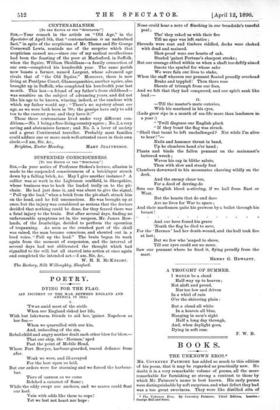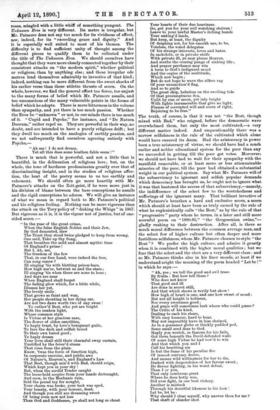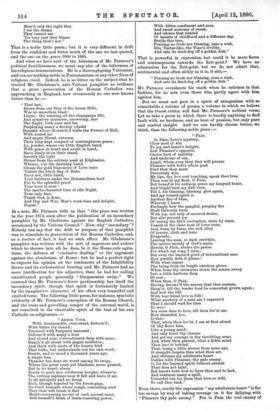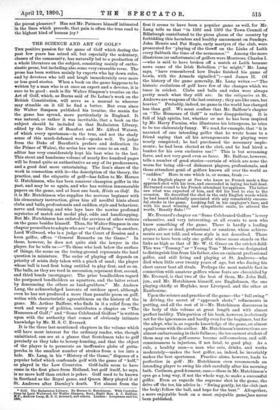BOOKS.
THE UNKNOWN EROS.*
Mn. COVENTRY PATMORE has added BO much to this edition of his poem, that it may be regarded as practically new. No doubt it is a very remarkable volume of poems, all the more- remarkable for furnishing so strong a contrast to those by which Mr. Patmore's name is best known. His early poems were distinguishable by soft surprises, and what defect they had was a too great sweetness. They were like distilled atta of
The Unknown Bros. By Coventry Patmore. l bird Edition. Leaden r George Bell and Sons.
roses, mingled with a little whiff of something pungent. The Unknown Eros is very different. Its metre is irregular, but Mr. Patmore does not say too much for its vividness of effect, nor, indeed, for its "exceeding grace and dignity." And it is especially well suited to most of his themes. The difficulty is to find sufficient unity of thought among the different pieces to qualify them to be collected under the title of The Unknown Eros. We should ourselves have thought that they were more closely connected together by their consistent attacks on "the modern spirit," whether political or religious, than by anything else; and these irregular ode metres lend themselves admirably to invective of that kind; indeed, nothing can be more different from the sweet shocks of his earlier verse than these stiletto thrusts of scorn. On the whole, however, we find the general effect too fierce, too unjust to the many forms of belief which Mr. Patmore assails, and too unconscious of the many vulnerable points in the forms of belief which he adopts. There is more bitterness in the volume than sympathy, and yet there is too much passion. Whether the Eros be " unknown " or not, to our minds there is too much of it. "Cupid and Psyche," for instance, and "De Natural Deorum," rather repel us. They are powerful in their way, no doubt, and are intended to have a purely religious drift ; but they dwell too much on the analogies of earthly passion, and we not unfrequently find ourselves agreeing entirely with Psyche,— " Ah me ! I do not dream, Yet all this does some heathen fable seem !"
There is much that is powerful, and not a little that is beautiful, in the delineation of religious love; but, on the whole, the tone of hardness predominates greatly over that of discriminating insight, and in the studies of religious affec- tion, the heat of the poetry seems to us too earthly and vehement. We should often go more heartily with Mr. Patmore's attacks on the Zeit-geist, if he were more just in his division of blame between the base conceptions he assails and the rigid conceptions he adores. We will give an instance of what we mean in regard both to Mr. Patmore's political and his religious feeling. Nothing can be more vigorous than the attack on the Tory policy of "dishing the Whigs" in 1867. But vigorous as it is, it is the vigour not of justice, but of one- sided scorn :— " In the year of the great crime,
When the false English Nobles and their Jew, By God demented, slew The Trust they stood twice pledged to keep from wrong, One said, Take up thy Song, That breathes the mild and almost mythic time Of England's prime !
But I, Ah, me,
The freedom of the few
That, in our free Land, were indeed the free, Can song renew ?
Ill singing 'tis with blotting prison-bars, How high soe'er, betwixt us and the stars ; Ill singing 'tis when there are none to hear; And days are near When England shall forget The fading glow which, for a little while, Illumes her yet, The lovely smile That grows so faint and wan, Her people shouting in her dying ear, Are not two claws worth two of any swan !
Ye outlaw'd Best, who yet are bright With the sunken light, Whose common style Is Virtue at her gracious ease, The flower of olden sanctities, Ye haply trust, by love's benignant guile, To lure the dark and selfish brood To their own hated good ; Ye haply dream Your lives shall still their °harmful sway sustain, Unstifled by the fever'd steam That rises from the plain.
Know, 'twas the force of function high, In corporate exercise, and public awe Of Nature's, Heaven's, and England's Law That Beat, though mix'd with Bad, should reign, Which kept you in your sky ! But, when the sordid Trader caught The loose-held sceptre from your hands distraught, And soon, to the Mechanic vain, Sold the proud toy for nought, Your charm was broke, your task was sped, Your beauty, with your honour, dead. And though you still are dreaming sweet Of being even now not less
Than God and Goddesses, ye shall not long so cheat
Your hearts of their due heaviness.
Go, get you for your evil watching shriven !
Leave to your lawful Master's itching hands Your unking'd lands, But keep, at least, the dignity Of deigning not, for his smooth use, to be, Voteless, the voted delegates Of his strange interests, loves and hates.
In sackcloth, or in private strife With private ill, ye may please Heaven, And soothe the coming pangs of sinking life ; And prayer perchance may win A term to God's indignant mood And the orgies of the multitude, Which now begin ; But do not hope to wave the silken rag Of your unsanction'd flag, And so to guide The great ship, helmless on the swelling tide Of that presumptuous Sea, Unlit by sun or moon, yet inly bright
With lights innumerable that give no light,
Flames of corrupted will and scorn of right, Rejoicing to be free."
The truth, of course, is that it was not "the Best, though mixed with Bad," who reigned, before the democratic wave overwhelmed them, but only the most cultivated,—a very different matter indeed. And unquestionably there was a narrow selfishness in the rule of the cultivated which alone would have ensured its doom. Had the aristocracy in power been a true aristocracy of virtue, we should have had a much earlier and nobler educational system for the poor than any we succeeded in getting till the poor got votes. Moreover, we should not have had to wait for their sympathy with the manifold removable, or at least more or less attenuateable miseries of the poor, till the poor had obtained a substantial weight in our political system. Say what Mr. Patmore will of the subserviency to ignorant and selfish popular demands which democracy has brought us, he ought not to ignore what it was that hastened the access of that subserviency,—namely, the indifference of the select few to the wretchedness and sufferings of the ignorant many. That brilliant invective of Mr. Patmore's breathes a hard and exclusive scorn, a. scorn which should at least have been as truly earned by the rule of what he euphuistically calls "the Best," as by the rule of that " progressive " party whom he terms, in a later and still more- scornful poem on "1880-85," "the Gergesenian swine,"— gladly rushing to their destruction. After all, is there so much moral difference between the common average man, and the select few of higher culture but often deeper and more fastidious selfishness, whom Mr. Patmore chooses to style "the Best "? We prefer the high culture, and admire it greatly when it is combined with the higher moral qualities ; but we fear that the select and the elect are a very different class : and so Mr. Patmore thinks also in his finer moods, at least if we understand aright the meaning of the poem headed "Let be !"
in which he says :—
"Ah, yes ; we tell the good and evil trees
By fruits : But how tell these ?
Who does not know That good and ill Are done in secret still, And that which shews is verily but show !
How high of heart is one, and one how sweet of mood :
But not all height is holiness, Nor every sweetness good ; And grace will sometimes lurk where who could guess ?
The Critic of his kind, Dealing to each his share, With easy humour, hard to bear, May not impossibly have in him shrined, As in a gossamer globe or thickly padded pod, Some small seed dear to God.
Haply yon wretch, so famous for his falls, Got them beneath the Devil-defended walls Of some high Virtue he had vow'd to win And that which you and I Call his besetting sin Is but the fume of his peculiar fire Of inmost contrary desire, And means wild willingness for her to die, Dashed with despondence of her favour sweet ; He fiercer fighting, in his worst defeat, Than I or you, That only courteous greet Where he does hotly woo, Did ever fight, in our best victory.
Another is mistook Through his deceitful likeness to his look !
Let be, let be : Why should I clear myself, why answer thou for me ?
That shaft of slander shot Miss'd only the right blot. I see the shame They cannot see : 'Tis very just they blame The thing that's not."
That is a noble little poem ; but it is very different in drift from the confident and bitter scorn of the one we list quoted, and the one on the years 1880 to 1885.
And what we have said of the bitterness of Mr. Patmore's political fastidiousness, we must say also of the bitterness of his religious denunciations. He is a thoroughgoing Vaticanist, and can see nothing noble in Protestantism or any other form of religious creed. Indeed, he is so bitter on the subject that he treated Mr. Gladstone's anti-Vatican pamphlet as evidence that a great persecution of the Roman Catholics was approaching in England, how erroneously no one now knows better than he "That last,
Blown from our Sion of the Seven Trill% Was no uncertain blast !
Listen : the warning all the champaign fills, And minatory murmurs, answering, mar The Night, both near and far, Perplexing many a drowsy citadel Beneath whose ill-watch'd walls the Powers of Hell, With armed jar And angry threat, surcease Their long-kept compact of contemptuous peace; Lo, yonder, where our little English band, With peace in heart and wrath in hand, Have dimly ta'en their stand, Sweetly the light Shines from the solitary peak at Edgbaston, Whence, o'er the dawning Land, Gleam the gold blazonries of Love irate 'Gainst the black flag of Hate.
Envy not, little band, Your brothers under the Hohenzollern hoof Put to the splendid proof.
Your hour is near !
The spectre-haunted time of idle Night, Your only fear, Thank God, is done, And Day and War, Man's work-time and delight, Began."
In a note, Mr. Patmore tells us that "this piece was written
in the year 1874, soon after the publication of an incendiary pamphlet by Mr. Gladstone against the English Catholics, occasioned by the Vatican Council." Now, why "incendiary"? Nobody can say that the drift or purpose of that pamphlet was to stimulate to persecution of the Roman Catholics, and, as a matter of fact, it had no such effect. Mr. Gladstone's pamphlet was written with the sort of eagerness and ardour which he throws into all he does, be it the Home-rule agita- tions, the defence of "exclusive dealing," or the argument against the absolutism of Rome; but he had a perfect right to express his opinion on the tendencies of the Infallibility decree and its ecclesiastical bearing, and Mr. Patmore had no more justification for his adjective, than he had for calling uncultivated people generally " Gergesenian swine." We contend that Mr. Patmore's fierce partisanship has itself the incendiary spirit, though that spirit is fortunately limited by the imaginative character of his often very beautiful and exalted verse. The following little poem, for instance, symbolic evidently of Mr. Patmore's conception of the Roman Church, and the crass and grovelling temper of the external world, is not conceived in the charitable spirit of the best of his own Catholic co-religionists :—
" ARMOR VITA.
With honeysuckle, over-sweet, festoon'd; With bitter ivy bound; Terraced with funguses unsound ; Deform'd with many a boss And closed scar, o'ercushioned deep with moss ; ]3unch'd all about with pagan mistletoe; And thick with nests of the hoarse bird That talks, but understands not his own word ; Stands, and so stood a thousand years ago, A single tree.
Thunder has done its worst among its twigs, Where the great crest yet blackens, never pruned, But in its heart, alway Ready to push new verdurous boughs, whene'er The rotting saplings near it fall and leave it air, Is all antiquity and no decay.
Rich, though rejected by the forest-pigs, Its fruit, beneath whose rough, concealing rind They that will break it find Heart-succouring savour of each several meat, And kernell'd drink of brain-renewing power,
With bitter condiment and sour,
And sweet economy of sweet, And odours that remind
Of haunts of childhood and a different day.
Beside this tree,
Praising no Gods nor blaming, sans a, wish,
Sits, Tartar-like, the Time's civility, And eats its dead-dog off a golden dish."
That is powerful in expression, but could it be more fierce
and contemptuous towards the Zeit-geist ? We have no admiration for the Zeit-geist, but we do not admit that,
sentimental and often sickly as it is, it sits,— " Praising no Gods nor blaming, sans a wish, And eats its dead-dog off a golden dish."
Mr. Patmore overshoots his mark when he satirises in that fashion, for he sets even those who partly agree with him
against him.
But we must not part in a spirit of antagonism with so remarkable a volume of poems, a volume in which we believe that the truest critics will find Mr. Patmore's noblest verse.
Let us take a poem in which there is hardly anything to find fault with, no hardness, and no heat of passion, but only pure and exalted insight. And we can hardly choose better, we
think, than the following noble piece :—
"PAIN.
0, Pain, Love's mystery, Close next of kin To joy and heart's delight, Low Pleasure's opposite, Choice food of sanctity And medicine of sin, Angel, whom even they that will pursue Pleasure with hell's whole gust Find that they must Perversely woo, My lips, thy live coal touching, speak thee true. Thou sear'st my flesh, 0 Pain, But brand'st for arduous peace my languid brain, And bright'nest my dull view, Till I, for blessing, blessing give again, And my roused spirit is Another fire of bliss, Wherein I learn Feelingly how the pangful, purging fire Shall furiously burn With joy, not only of assured desire, But also present joy Of seeing the life's corruption, stain by stain, Vanish in the clear heat of Love irate, And, fume by fume, the sick alloy Of luxury, sloth and hate Evaporate; Leaving the man, so dark erewhile, The mirror merely of God's smile.
Herein, 0 Pain, abides the praise For which my song I raise ; But even the bastard good of intermittent ease How greatly doth it please !
With what repose The being from its bright exertion glows, When from thy strenuous storm the senses sweep Into a little harbour deep Of rest ; When thou, 0 Pain, Having devour'd the nerves that thee sustain, Sleep'st, till thy tender food be somewhat grown again ; And how the lull With tear-blind love is full !
What mockery of a man am I express'd That I should wait for thee To woo !
Nor even dare to love, till thou lov'st me.
How shameful, too, Is this : That, when thou lov'st, I am at first afraid Of thy fierce kiss, Like a young maid ; And only trust thy charms
And get my courage in thy throbbing arms.
And, when thou partest, what a fickle mind Thou leav'st behind, That, being a little absent from mine eye, It straight forgets thee what thou art, And ofttimes my adulterate heart Dallies with Pleasure, thy pale enemy.
0, for the learned spirit without attaint That does not faint,
But knows both how to have thee and to lack,
And ventures many a spell, Unlawful but for them that love so well, To call thee back."
Even there, surely the expression "my adulterate heart "is far too savage by way of taking revenge on it for dallying with "Pleasure thy pale enemy." For is Pain the real enemy of the purest pleasure ? Has not Mr. Patmore himself intimated in the lines which precede, that pain is often the true road to the highest kind of human joy P





































 Previous page
Previous page